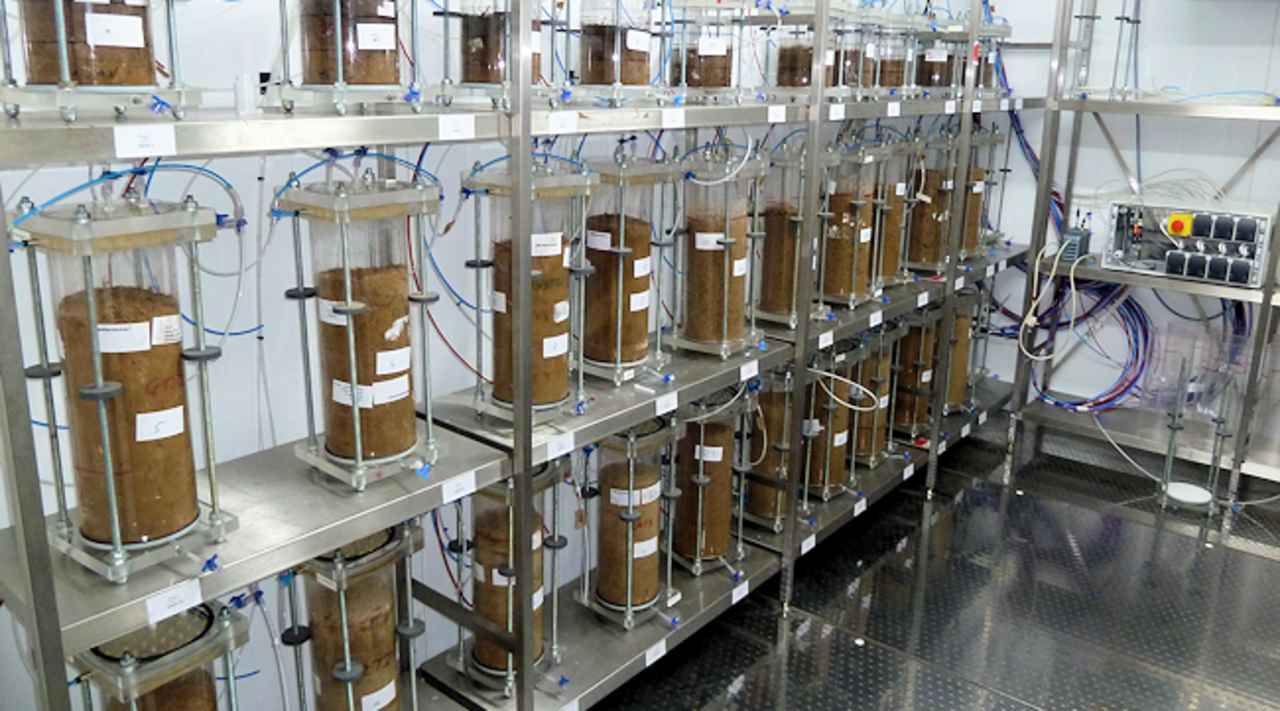Project
Effect of soil pH on nitrous oxide emissions from agricultural soils

Mitigating Agricultural Greenhouse Gas Emissions by improved pH management of soils (MAGGE-pH)
A climate smart pH regulation of agricultural soils could mitigate nitrous oxide emissions. Potentials and trade-offs will be examined in MAGGE-pH.
Background and Objective
Nitrous oxide emissions from agricultural soils are a major greenhouse gas source within the sector agriculture. Soil microbial processes are responsible for nitrous oxide production and consumption.
Reactive nitrogen and organic carbon from fertilisation, crop residues remaining after harvest and humus are important precursors for microbial derived nitrous oxide production. The efficient use of these nutrient sources in the scope of good agricultural practice can mitigate nitrous oxide emissions. But the related mitigation potential is limited because fertilisation and incorporation of organic carbon sources (crop residues and amendments) are required to maintain optimal crop production and preserve soil humus contents. Management options that support the consumption of N2O in soils would be an efficient possibility to further increase mitigation potentials achieved by good agricultural practise.
The project MAGGE-pH examines the effect of soil pH on the relationship between nitrous oxide production and consumption assuming that an increase of pH will support the transformation of the potent greenhouse gas nitrous oxide to climate-neutral atmospheric nitrogen in soil. Thus nitrous oxide emissions could be mitigated by pH regulation. In MAGGE-pH, combined laboratory studies, field experiments and model simulations will approximate the mitigation potential in North and Central Europe and New Zealand.
Approach
The Thuenen- institute participates with two work packages. One package will analyse the effects of soil pH on N2O production and consumption pathways and the sensitivity of these enzyme mediated reactions on soil environmental conditions by mesocosm and lysimeter experiments. In particular we are interested of pH effects on
- nitrous oxide emissions,
- the contribution of microbial processes on nitrous oxide production (nitrification, denitrification, nitrifier denitrification, fungal denitrification, heterotrophic bacterial denitrification, co- denitrification),
- the ratio between nitrous oxide production and consumption,
- mineralisation,
- carbon dioxide losses due to mineralisation and liming,
The other package will enable process models and empirical approaches to consider pH effects that have been observed in lab and field experiments. These modelling tools will be applied at various spatial scales. We are interested in longterm effects of soil pH on greenhouse gas emissions, nitrate leaching and nitrogen use efficiency and related sensitivities on natural conditions. We will quantify mitigation potentials that would be achievable by a climate smart pH regulation on national scale. Moreover possible formulations of incentives or regulations to effectively mitigate nitrous oxide emissions in agricultural practise will be tested with regard to emerging costs and benefits.
Data and Methods
To examine pH effects on N cycling processes in detail we will conduct various lab experiments using mesocosms and lysimeters with and without vegetation. Automated gas measurements will be combined with stable isotope measurements (13C, 15N, 18O) to determine the transformation of N2O to N2. Because we are interested in long term pH effects soils from longterm experiments with various pH treatments will be used.
Process based models trained on lab and field data will be used to simulate longterm effects of pH management on greenhouse gas fluxes, crop yield and N leaching. Starting with field experiments conducted by project partners within MAGGE pH we will analyse these long term effects for various weather conditions and soil properties.
Established stochastic models used to predict nitrous oxide emissions at national or global scale will be extended by a pH response and used to quantify national nitrous oxide emissions from agricultural soils. Scenarios of good agricultural practice will be compared with scenarios assuming a climate smart pH regulation to approximate mitigation potentials by pH regulation.
The agro-economic mode RAUMIS will be extended to consider effects and costs of pH regulation. The integrated approach combining RAUMIS and a stochastic N2O model will then be used to examine the impact of national incentives and regulations on income, production, greenhouse gas emissions and land use.
Our Research Questions
- Can it be shown by field experiments that soil pH mitigates nitrous oxide emissions?
- How does pH influence microbial driven nitrogen and carbon cycling processes in agricultural soils?
- What is the mitigation potential of pH regulation on national scale?
- How incentives or regulations should be designed to realize the maximal N2O mitigation potential with in the same time minimized costs and effects on productivity, land use and production?
Results
The mesocosm experiments showed that soil pH affects the N2O/N2 product ratio considerably. Thus, nitrous oxide emissions produced by denitrification processes are lower at high pH levels.
Instantaneous limed soils show elevated CO2 emissions but it is yet unclear to which extent CO2 originates from liming products or elevated decomposition processes, respectively.
The analyses of published meta data sets about N2O emissions for field experiments showed that nitrous oxide emissions are generally lower for soils with elevated pH values. This supports the observations of the mesocosm experiments. The effect depends on soil properties like the clay content and the soil organic carbon content and on natural conditions like the mean annual precipitation.
In Germany, about 41 % of arable land and 52% of grassland have soil-pH values below recommended levels corresponding to good agricultural practise. Thus, there is a potential of mitigating direct nitrous oxide emissions by increasing the pH level of those sites up to recommended levels.
The efficiency of greenhouse gas mitigation by pH increase depends strongly on CO2 emissions caused by additional liming. A wide range of emission factors to quantify CO2 emissions from applying carbonates have been published.
We quantified the greenhouse gas mitigation potential for two scenarios. Scenario 1 assumes a pH increase until the lower boundary of the optimal pH range. Scenario 2 assumes a pH increase up to the higher boundary of recommended pH levels. Calculations were done for the sites of the German agricultural soil inventory.
Scenarios 1 and 2 caused pH increases and therefore N2O mitigation for about 45% and 77% of agricultural sites, respectively. On average, nitrous oxide emissions were reduced by about 6% in scenario 1 and 14% for scenario 2. Assuming emission factors for CO2 emissions from lime applications by IPCC and West and McBride, we find a greenhouse gas decrease by pH regulation for 10.7 – 12.2 % of sites for scenario 1. For scenario 2 the share of sites with greenhouse gas mitigation by pH increase adds up to 13 till 17.3%.
The application of the biogeochemical model DNDC-CAN using data of the mesocosm experiments has shown that former implemented effects do not describe observed N2 and N2O fluxes and the product ratio in dependence on pH satisfactory. Modifications of implemented functions and calibration helped to improve the description of observed N2O (N2O+N2)-1 product ratios by the model.
A detailed description of the results can be found in hte final report to Bundesanstalt für Landwirtschaft und Ernährung (BLE)
Links and Downloads
Thünen-Contact

Involved Thünen-Partners
Involved external Thünen-Partners
- Aarhus University
(Aarhus, Tjele, Dänemark) -
Norwegian University of Life Sciences
(Ås, Norwegen) -
University of Helsinki [FI]
(Helsinki, Finnland) -
Institut national de recherche pour l’agriculture, l’alimentation et l’environnement (INRAE)
(Paris, Toulouse, Montpellier, Avignon, Ivry-sur-Seine, Clermont-Ferrand, Rennes, Thiverval-Grignon, Dijon, Orleans, Bordeaux, Pierroton, Frankreich) - The Irish Agriculture and Food Development Authority - TEAGASC
(Carlow, Fermoy, Johnstown, Irland) - National University of Ireland Galway
(Galway, Irland) -
University of Otago
(Otago, Neuseeland) -
Swedish University of Agricultural Science - SLU
(Uppsala, Lysekil, Schweden) -
Natural Environment Research Council (NERC) XXXXX
(Edinburgh, Swindon, Großbritannien (inkl. Nordirland))
Funding Body
-
Federal Office for Agriculture and Food (BLE)
(national, öffentlich)
Duration
11.2017 - 3.2021
More Information
Project funding number: 2817ERA07C
Funding program: EU - JPI on Agriculture, Food Security and Climate Change (JPI FACCE)
Project status:
finished
Publications
- 0
Zhang B, Zhou M, Zhu B, Kemmann B, Pfülb L, Burkart S, Liu H, Butterbach-Bahl K, Well R (2023) Threshold-like effect of soil NO3- concentrations on denitrification product N2O/(N2O+N2) ratio is mediated by soil pH. Soil Biol Biochem 187:109213, DOI:10.1016/j.soilbio.2023.109213
- 1
Dechow R, Fuß R, Well R (2021) Minderungspotentiale direkter Lachgasemissionen landwirtschaftlicher Flächen über ein klima-optimiertes pH Management (Mitigating Agricultural Greenhouse Gas Emissions by improved pH management of soils; MAGGE-pH) : Projektabschlussbericht an die Bundesanstalt für Landwirtschaft und Ernährung (BLE), Förderkennzeichen: 2817ERA07C. 34 p
- 2
Dechow R, Fuß R, Well R (2021) Mitigating Agricultural Greenhouse Gas Emissions by improved pH management of soils; MAGGE-pH. Braunschweig: Thünen Institute of Climate-Smart Agriculture, 2 p, Project Brief Thünen Inst 2021/28a, DOI:10.3220/PB1635773027000
- 3
Dechow R, Fuß R, Well R (2021) Wie sich Lachgasemissionen landwirtschaftlicher Flächen durch ein klimaoptimiertes pH-Management senken lassen; MAGGE-pH. Braunschweig: Thünen-Institut für Agrarklimaschutz, 2 p, Project Brief Thünen Inst 2021/28, DOI:10.3220/PB1635772750000

![[Translate to English:] Logo des Bundesministerium für Ernährung und Landwirtschaft](/media/allgemein/logos/BMEL_Logo.svg)